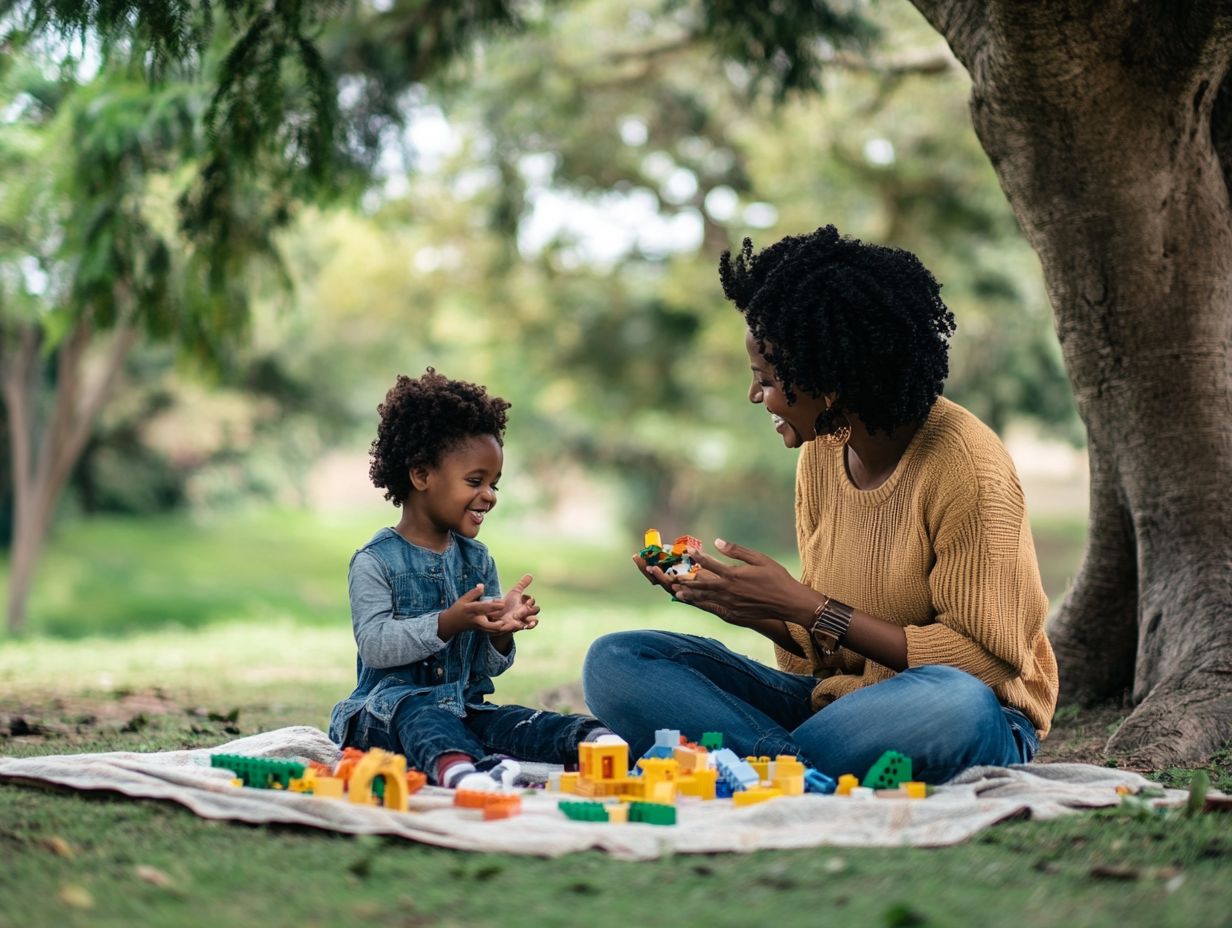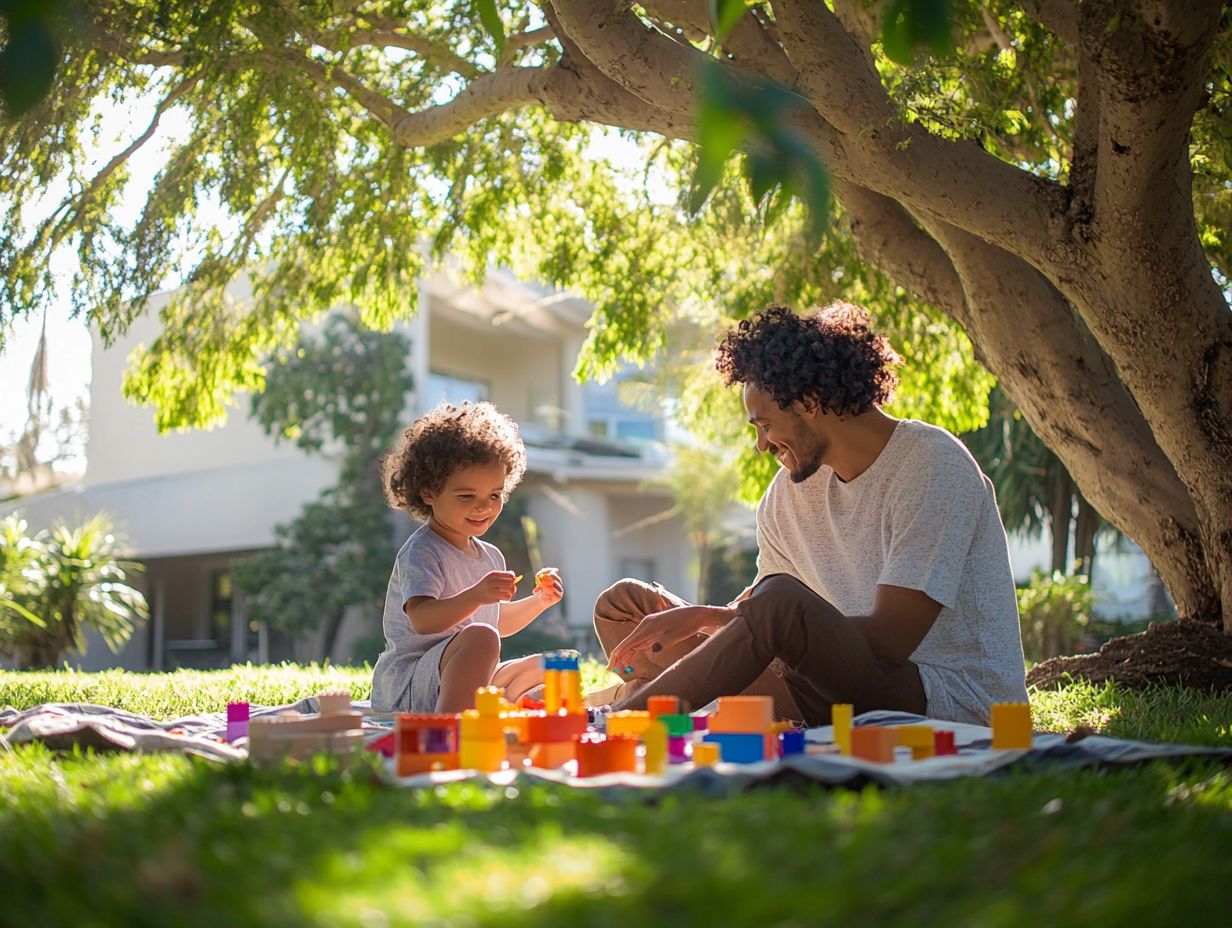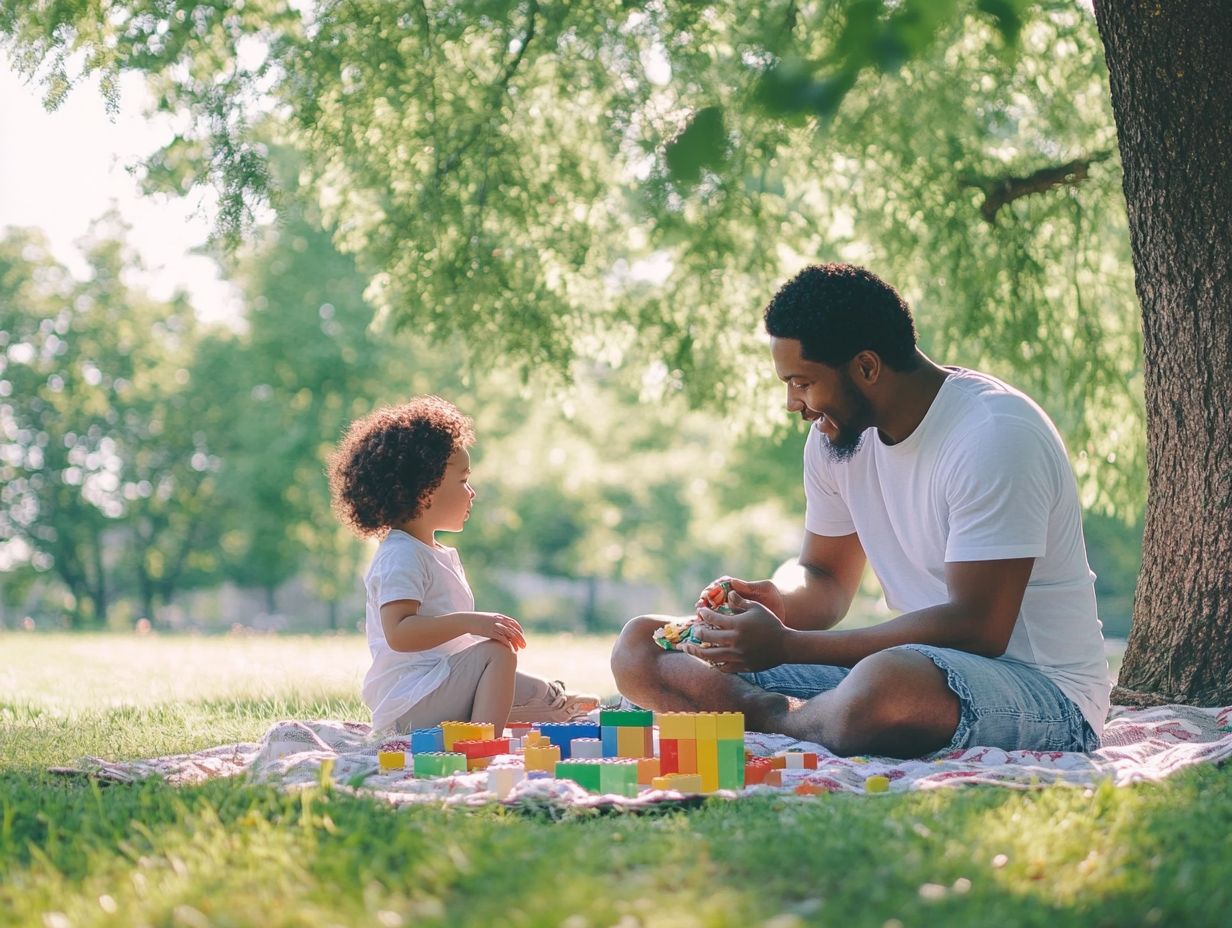5 Activities for Mindful Parenting
In today s fast-paced world, the concept of mindful parenting may slip through your fingers. Embracing mindfulness can enrich your connection with your child and promote emotional well-being for both of you.
This article explores five engaging activities that blend mindfulness into your daily routine. These strategies not only benefit your children but also create a calmer atmosphere for the entire family.
Discover how to nurture a more mindful parenting approach. Strengthen those invaluable relationships.
Contents
- Key Takeaways:
- 1. Practice Mindful Breathing Together
- 2. Engage in Sensory Activities
- 3. Create a Gratitude Journal
- 4. Encourage Mindful Communication
- 5. Incorporate Mindful Movement into Daily Routines
- How Can Mindful Parenting Benefit Both Parents and Children?
- Frequently Asked Questions
- What are 5 activities for mindful parenting?
- How can mindful breathing exercises benefit my parenting?
- Why is gratitude journaling important for mindful parenting?
- How can I practice mindful communication with my child?
- How do nature walks and outdoor play promote mindful parenting?
- Why should I include family meditation sessions in my mindful parenting routine?
Key Takeaways:

- Practicing mindful breathing together helps reduce stress and improves focus.
- Engaging in sensory activities allows you to connect and be present.
- Creating a gratitude journal promotes positive thinking for everyone.
1. Practice Mindful Breathing Together
Mindful breathing transforms your dynamic with your child. It fosters emotional health and resilience as you face parenting challenges.
This practice does more than just calm stress and anxiety; it creates a deeper connection through shared moments of awareness and acceptance. This paves the way for more compassionate interactions that enhance your parent-child relationship.
Incorporating techniques like deep breathing exercises can work wonders for emotional regulation. Start by inhaling deeply through your nose, holding for a few seconds, and then exhaling slowly through your mouth. Encourage your child to mirror your rhythm.
Making this practice enjoyable is key. Consider adding fun elements, like pretending to blow up a balloon, turning deep breathing into a playful activity. Engaging in activities such as nature walks or simple yoga poses can further bolster mindfulness, allowing your family to explore feelings together.
By embracing these techniques, you cultivate resilience while navigating the everyday stresses of parenting.
2. Engage in Sensory Activities
Engaging in sensory activities serves as a powerful means to elevate mindfulness in your parenting. Incorporating creative ways to practice mindfulness daily allows your children to explore their feelings and reactions, fostering emotional well-being and growth.
Consider the range of activities at your disposal from simple play with textured materials like playdough to enriching experiences such as nature walks, where your children can touch leaves and inhale the fragrance of flowers. These activities encourage a deeper understanding of their surroundings.
For toddlers, squishing finger paints invites color exploration while aiding in developing fine motor skills. Meanwhile, school-aged children thrive through cooking projects that involve measuring and mixing, seamlessly blending creativity with practical skills.
Through these diverse sensory experiences, your children learn to identify their emotions and comprehend their responses. This journey ultimately cultivates resilience and emotional intelligence that will accompany them throughout their lives.
3. Create a Gratitude Journal
Creating a gratitude journal can truly elevate your parenting experience. It invites both you and your children to embrace self-love and foster positive emotions through daily reflections on your lives. This practice nurtures an atmosphere of open communication and emotional connection within your family.
Set aside a specific time each day perhaps during dinner or right before bedtime to reflect together on what you are grateful for.
To spark meaningful conversations, try these effective prompts:
- Encourage each family member to share one positive moment from their day.
- Ask about a quality they admire in one another.
These prompts can lead to heartfelt entries that transform into cherished memories over time. Engaging in this mindful reflection enhances emotional well-being and reinforces gratitude as an essential foundation of familial love.
4. Encourage Mindful Communication

Encouraging mindful communication between you and your children cultivates a deeper understanding of each other’s emotions. This paves the way for compassionate relationships and improved emotional well-being.
By actively engaging in meaningful conversations and truly listening, you can create an atmosphere where every family member feels valued and understood.
For instance, when your child expresses frustration about school, rather than brushing off their feelings, you might respond with empathy: I can see you re really upset about this; can you share more with me?
This straightforward act of active listening not only validates their feelings but also fosters open dialogue.
Incorporating regular family meetings to discuss emotions and experiences grants everyone a platform to express themselves freely. This practice can dramatically strengthen family ties and enhance daily interactions, allowing you all to connect on a deeper level.
5. Incorporate Mindful Movement into Daily Routines
Incorporating mindful movement into your daily routine can create joyful moments of connection between you and your children. It reduces stress while promoting emotional health and self-awareness.
Whether you’re engaging in yoga sessions that invite everyone to breathe and stretch together or simply enjoying playful stretching exercises in the living room, these activities can foster a deeper bond.
As you embrace these gentle movements, you also cultivate mindfulness and enhance your ability to stay present and attentive to each other s needs. This practice not only aids in physical development but also nurtures mental resilience, encouraging each family member to express their feelings openly.
Over time, these shared moments can transform the atmosphere of your home, cultivating a nurturing environment that prioritizes well-being and connection.
How Can Mindful Parenting Benefit Both Parents and Children?
Mindful parenting brings a wealth of benefits for you and your children, creating an atmosphere that nurtures emotional health, resilience, and a profound connection through shared mindfulness practices.
By focusing on the present moment and being aware, you can handle parenting stress better. You also help your children learn how to manage their feelings and treat themselves kindly, ultimately enriching their overall development and well-being.
Research from reputable organizations like ZERO TO THREE underscores that mindful approaches can lead to significant reductions in parental anxiety, fostering a calmer home environment.
Experts such as Mark Bertin highlight the crucial role of these practices in enhancing emotional intelligence. Elisha Goldstein points out that when you model mindfulness, it not only elevates your mental well-being but also cultivates adaptive coping mechanisms in your children.
As a result, your family will experience stronger bonds, improved communication, and a safe space for emotional expression, all of which lay the groundwork for healthier relationships and greater resilience.
What Are Some Obstacles to Practicing Mindful Parenting?
Practicing mindful parenting undeniably presents its own set of challenges, including the stressors of daily life, various parenting hurdles, and the struggle to maintain consistent mindfulness amid countless distractions.
These obstacles are often intensified by the relentless pace of modern life, where you juggle work commitments and household duties, leaving little room for introspection. Many parents find it tough to carve out those precious quiet moments for themselves, making it nearly impossible to respond to their children with the attunement and presence they desire.
To successfully navigate these hurdles, you can enhance your practice by cultivating self-compassion and embracing the notion that imperfection is simply part of the journey.
Building a community of like-minded parents offers invaluable support. You can share experiences and strategies that make mindful parenting more achievable.
How Can Parents Make Time for Mindful Parenting?

Finding time for mindful parenting amidst your busy schedule can feel daunting. Yet, it s crucial for nurturing emotional health and building strong connections with your children.
To seamlessly weave mindfulness into your daily routine, start by designating specific moments for deep breathing or relaxation exercises. This could be a few quiet minutes of focused breathing in the morning before the day kicks off or a brief pause during lunch to check in with your feelings and thoughts.
Consider incorporating mindfulness activities, such as short family meditations or sharing what you re grateful for at dinner. These practices not only nurture your well-being but also strengthen the connections within your family.
By prioritizing these mindful moments, you enhance your emotional resilience and model essential life skills for your children, creating a healthy, supportive environment at home.
What Are Some Additional Resources for Mindful Parenting?
Numerous resources are available to support you on your journey toward mindful parenting, including insightful books, mindfulness classes, and vibrant online communities dedicated to emotional well-being.
Notable works by authors like Amy Saltzman offer practical advice and invaluable insights. They help you cultivate a calm and aware mindset amid the chaos of daily life.
Workshops provide hands-on experiences, allowing you to practice mindfulness techniques in real-time. Meanwhile, interactive online platforms create valuable spaces for community support and shared experiences.
These diverse resources assist you in managing challenges such as stress and emotional outbursts and foster a deeper connection with your children. Ultimately, this creates a more harmonious family environment.
How Can Mindful Parenting Help with Parent-Child Relationships?
Mindful parenting can profoundly enhance your relationship with your child by creating an environment rich in open communication, understanding, and emotional well-being.
By integrating specific mindfulness techniques into your daily routine, you ll discover a new awareness of your feelings and reactions. This enables you to respond to your child’s needs with patience and empathy.
Practices such as deep breathing, active listening, and reflective observation help you manage stress while fostering a space where your child feels valued and truly heard.
Over time, these approaches encourage emotional resilience for both you and your child. This leads to more harmonious interactions and stronger bonds. As these relationships flourish, the long-term benefits include improved emotional intelligence, enhanced conflict resolution skills, and a foundation of trust that can weather life’s challenges.
What Are Some Simple Ways to Incorporate Mindful Parenting into Daily Life?
Incorporating mindful parenting into your daily life doesn’t have to be complicated; even simple practices, like essential mindfulness techniques for teens, can lead to meaningful changes in emotional health for both you and your children.
By integrating straightforward techniques, like mindful breathing exercises, your family can cultivate a sense of calm during hectic moments. This allows everyone to hit the pause button and reset.
Another effective activity is establishing a gratitude practice perhaps during dinner or family gatherings where each member shares something they appreciated that day.
These quick moments can make a big difference! They can effortlessly weave mindfulness into your everyday routines, fostering a supportive environment that enhances well-being and reduces stress for everyone involved.
Frequently Asked Questions

What are 5 activities for mindful parenting?
1. Mindful breathing exercises; 2. Gratitude journaling; 3. Mindful communication with your child; 4. Nature walks and outdoor play; 5. Family meditation sessions.
How can mindful breathing exercises benefit my parenting?
Mindful breathing exercises can help you stay present and calm in moments of stress or frustration. By taking deep, intentional breaths, you can control your emotions and respond to your child with patience and empathy.
Start practicing mindful parenting today to experience a positive change in your family dynamics!
Why is gratitude journaling important for mindful parenting?
Practicing gratitude shifts your mindset. It helps you focus on the positive aspects of parenting.
By writing down what you’re thankful for, you feel more appreciation and contentment. This boosts your overall well-being as a parent!
How can I practice mindful communication with my child?
Mindful communication means talking carefully and thoughtfully with your child. It involves listening without judgment and responding with care.
You can also reflect back what your child says to show you’re listening. Asking open-ended questions keeps the conversation going!
How do nature walks and outdoor play promote mindful parenting?
Being in nature helps you and your child unplug from technology. It encourages you to be present and enjoy the moment together.
Explore the beauty of nature and engage in fun, sensory activities. These experiences promote mindfulness for both of you!
Why should I include family meditation sessions in my mindful parenting routine?
Meditation helps you and your child find a sense of calm and awareness. Practicing together strengthens your family bond and creates a peaceful home.






